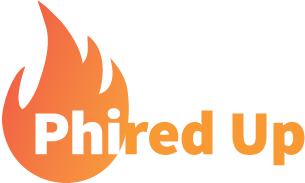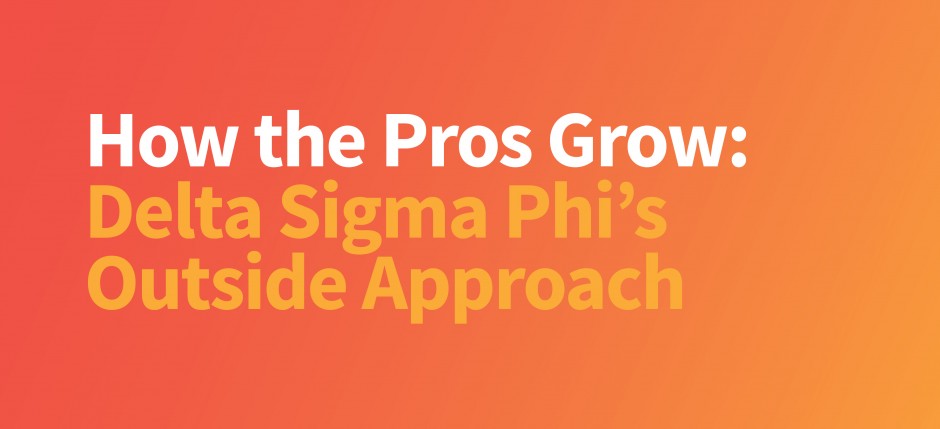How the Pros Grow: Delta Sigma Phi’s Outside Approach
by Matt Farrell
Less than two years ago, both Ry Beck and Gage Abell worked heavily in growth – but completely outside of the fraternity scope.
Now, they’re guiding Delta Sigma Phi through building an organization-wide growth system – with their past professional experiences helping shape priorities.
We enjoyed the chance to sit down with Ry (Director of Fraternity Growth) and Gage (Assistant Director of Fraternity Growth) to learn about their stories, tactics, and forecasts for the future.
Whether you are a member of Delta Sigma Phi or recruiter for another organization, we’re excited for how their story will shape yours.
Prompts from Phired Up are labeled in bold.
Where did your passion for growth come from?
Ry: In the context of fraternity, membership growth means creating more relationships and connections. If we’re providing the right experience, those relationships will go on to create positive personal development and community engagement opportunities for everyone involved. In short, our ability to grow the organization should mean we are broadening the positive impact of every individual within the organization.
In a previous role, I served as a Recruitment and Engagement Manager for a nonprofit called Princeton AlumniCorps. The organization provided professional and leadership development opportunities for recent Princeton University graduates and public interest professionals. My role on the team was to help students and our partner organizations find each other. Specifically, I recruited seniors and recent graduates with the goal of placing them with nonprofit organizations for one-year fellowship opportunities.
Very early into the role, I realized how important relationships were to the process. It wasn’t enough to know if someone had the skills and experience necessary for a job, I needed to understand how a particular fellowship aligned with someone’s personal life story. Our applicants each had a unique view of the world and imagined their lives a certain way after graduation. Some wanted more time to explore a passion, some had very calculated trajectories that required a certain “next step” to fit into their bigger picture. I needed to understand the narrative from their perspective if we were going to be successful.
As most student leaders and professionals have seen on most campuses over the years, fraternity and sorority recruitment tends to be a blur of impersonal events with surface-level interactions. I realize that is not a unique observation, but when I started working in this role for Delta Sigma Phi, I was excited to apply my experiences to help move the needle. We have to help people feel comfortable making genuine relationships, we need to accelerate the pace at which new relationships can be formed, and, in many ways, we need to start viewing prospective new members the same way other organizations view talent acquisition.
Gage: My passion for fraternity growth and Delta Sigma Phi originated from my extracurricular involvements. Growing up, I stayed very involved in sports, music, and community engagement. Togetherness and team-building were an essential part of each of these. As anyone who has been a part of a truly great team would say, the feeling is unparalleled and serves as a continuous driving force to replicate it. These experiences have influenced my motivation to develop action-oriented teams
Prior to joining staff at Delta Sigma Phi, I worked on political campaigns in Kentucky. In my role, I oversaw field teams which focus on direct voter contact including door knocks, phone calls, rallies, and more. A field team’s primary goal is to grow their list of identified supporters and turn them out on election day. The work heavily relies on establishing personal connections and creating a shared understanding between strangers, often occurring right on their doorstep. In nearly all aspects of campaigning, people are the most valuable asset. People are the voters, donor, volunteers, and greatest advocates. A people-powered campaign can be inspirational, infectious, and extremely motivating.
In more ways than not, fraternal organizations act and operate like a political campaign; in fact, it’s fitting we call new chapter expansions ‘campaigns’. The key to success lies in the common belief that we’re better together than we are separate. This shared vision keeps me motivated to grow our organization, and develop exceptional teams.
How are you so successful when it comes to recruiting men into Delta Sigma Phi? What are the tactics you live by?
Gage: Every year, tens of thousands of new members join a fraternity. Each of these members likely have a common chapter in their joining story- someone took initiative to reach out to him. This is a simple action-but the timing has to be perfect. We can’t let someone contact them first. So many chapters let their names list go uncontacted. They just wait to see who shows up to rush. When they do that, they are losing out on quality and quantity. We must contact first, be intentional with our follow up, and focus heavily on building meaningful personal relationships. To sum up, one of my favorite comparisons is to a work of modern art depicting an all-white canvas selling for upwards of $20 million. A skeptical onlooker states, “That’s so easy, I could have done that!”, to which the artist replies, “But you didn’t, I did.”
Ry: I’m going to steal from Nike here, “just do it”. Whatever action you can take today is going to be helpful. I hear so many excuses as to why a person won’t join, or why an outreach idea won’t work. People are so concerned with failure that they forget to try. In most cases, it’s not that people don’t know how to recruit, it’s that they choose not to take the actions necessary to recruit.
Not sure where you fall in that category? What if I asked you this question…“For one million dollars, in 24-hours, could you identify 100 students you’ve never met before?” If the answer is yes, then you know how to take the next step. If you don’t add 100 potential new members to your candidate pool in 24-hours, it’s not because you didn’t know how, it’s because you chose not to do it. If the answer is no, then training will help. I’m just willing to bet that most chapter leaders would take that bet and find a way. So, what makes us successful? We choose to take action every day. The plan can always be better, but you should take action with the knowledge and resources at your disposal and shoot your shot.
Growth in this era will look different. What do you want students to know about how you build a future growth strategy?
Ry: Know your market and leverage technology. Students’ preferences will always change, but the rate of change is exponentially faster now than during previous generations. Growth during this era means constantly assessing why students are coming to college, how they imagine their experience, and what they need by the time they graduate. Ask your own members what they want more often, ask students who don’t join what they want, keep learning and finding ways to fill the gaps.
Regarding technology, start using it intentionally. Get a CRM like ChapterBuilder, use Slack and Google Docs to share ideas, do something other than a group chat. If your chapter thinks sidewalk chalk and a notepad are going to help you recruit the best students on your campus, I hate to say it, but your chapter will be left behind. That goes for any Delta Sig chapters that are seeing this, too. Go talk to someone in your admissions office or in your athletic program and ask them how they recruit. I doubt your head football coach pulls out a notepad with someone’s name on it and then says that is the entire strategy. I get it, we join a friend group, but then we’re asked to run a business. The reality is that the business produces relationships that can have a real impact on your life. So, elevating your growth strategy by doing some market analysis and using technology will lead to incredible value now and later in life.

